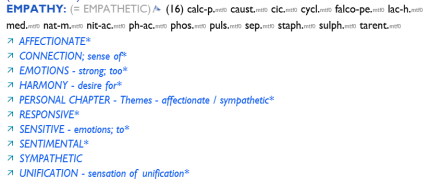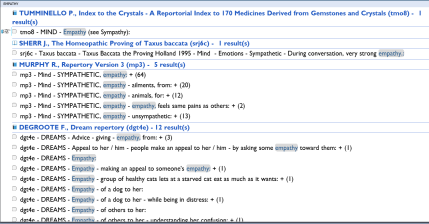Empathy
-
The action of understanding, being aware of, being responsive to, and vicariously experiencing the feelings, thoughts, and experience of another
-
Synonyms
- Compassion, Sympathy, Understanding, Sensitivity, Kindness, Heart, Tenderness, Warmth, Humanity, Solicitude
-
Antonyms
- Apathy, Indifference, Insensitivity, Callousness, Cruelty, Coldness, Harshness, Brutality, Inhumanity, Unfeelingness
Situation / characterization
The empath embodies a profound way of perceiving and engaging with the world.
- In relationships, they create a safe space for emotional expression, intuitively understanding the underlying motives and fostering growth. These types possess an innate ability to listen attentively and sympathise with the emotions of others. Their empathetic presence brings solace to those burdened by life's trials, offering support and compassion. In their romantic life, empaths tend to possess an uncanny knack for sensing their partner's needs and desires.
- At the workplace, they navigate interpersonal dynamics, bringing unity and collaboration through their keen awareness - offering encouragement and support to keep motivations high, whilst instilling a sense of camaraderie.
- In the realm of family life, their empathetic nature can often express itself in its purest form. They navigate the intricacies of familial bonds with sensitivity and grace, cultivating an environment of understanding and acceptance. They are the one who listens intently during moments of distress, providing a safe space for loved ones to share their deepest fears and joys. Whether it be consoling a sibling through heartbreak or celebrating a parent's achievements, their empathy resonates through every family interaction, weaving a tapestry of love and compassion.
- In times of crisis, they offer solace and guidance, tapping into wisdom and resilience. The empath's presence, infused with understanding of the human psyche, guides others toward wholeness and profound self-discovery.
While empaths possess an innate gift, the ability to deeply connect with others on an emotional level can lead to overwhelming experiences, as they absorb the joys, sorrows, and struggles of those around them.
Some of the challenges faced by empaths may be:
- Emotional Overload: Empaths often experience an inundation of emotions, struggling to differentiate their own feelings from those of others, leading to psychological overwhelm and a sense of being emotionally submerged.
- Energetic Imbalances: Empaths may encounter disruptions in their energetic equilibrium, as they absorb and carry the energetic imprints of others, resulting in imbalances that can manifest as physical or psychological symptoms.
- Boundaries and Self-Care: Empaths face challenges in establishing and maintaining healthy boundaries, which can lead to difficulties in self-care and a tendency to prioritize the needs of others over their own well-being.
- Sensory Sensitivities: Empaths frequently experience heightened sensitivity to sensory stimuli, becoming overwhelmed by external stimuli such as noise, crowds, or strong scents, which can trigger stress and anxiety.
- Transference and Emotional Fusion: Empaths can unconsciously merge their own identity with others, leading to a loss of self and a blurring of emotional boundaries, making it difficult to distinguish their own emotions from those of others.
Opposite expression
-
In an example contrasting empathy, let us consider a situation where someone embodies the opposite quality. Imagine a scenario where a coworker receives a promotion, and instead of offering congratulations and support, this individual responds with bitter jealousy and contempt. They choose to undermine their coworker's success, belittling their achievements and spreading negativity throughout the workplace. In this case, the person demonstrates a lack of empathy, failing to celebrate the joy and accomplishments of others, and instead choosing to prioritize their own insecurities and negative emotions.



